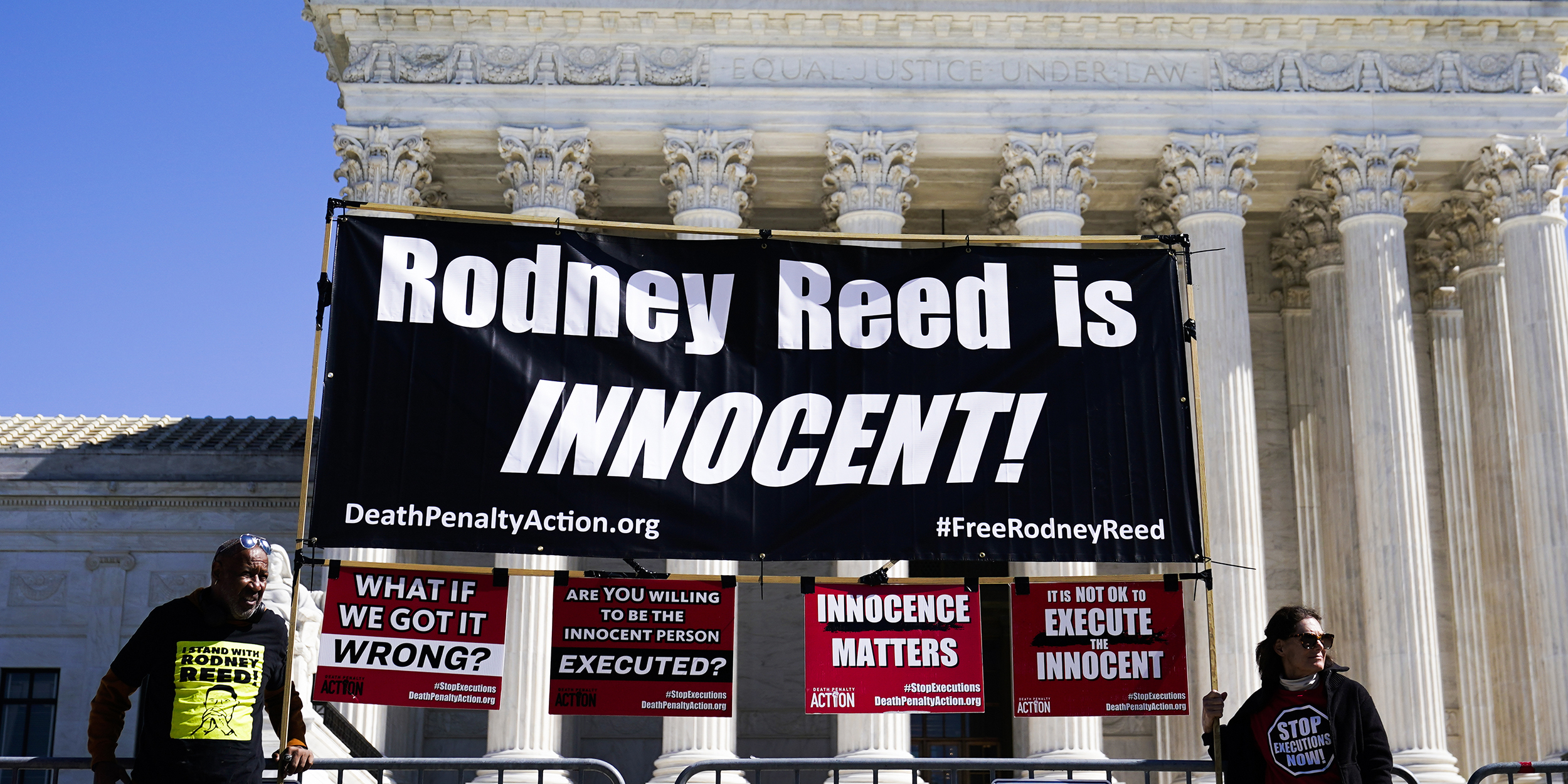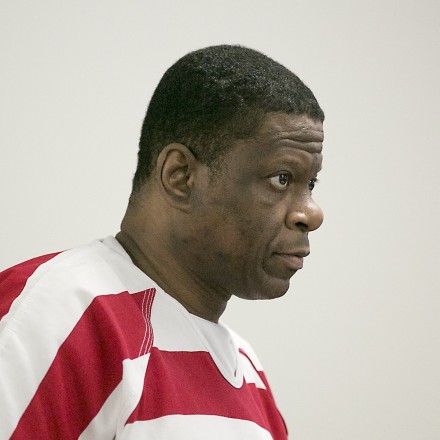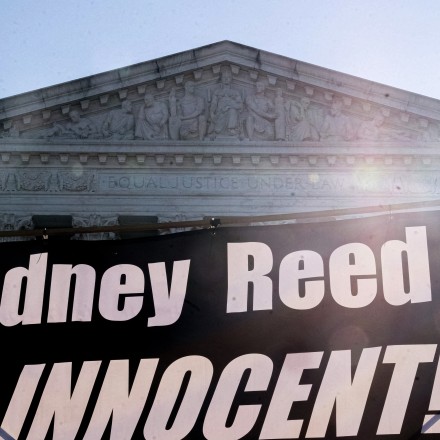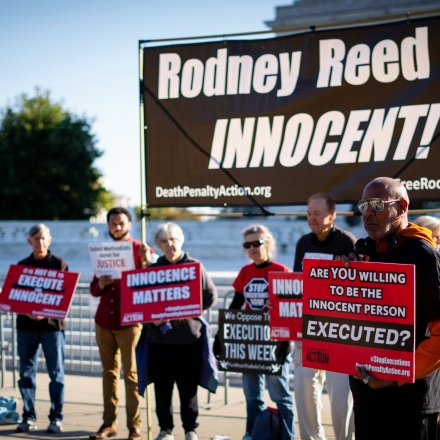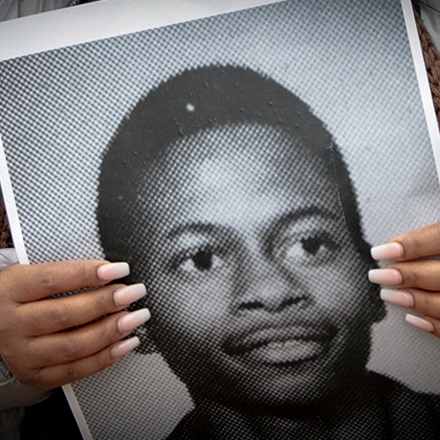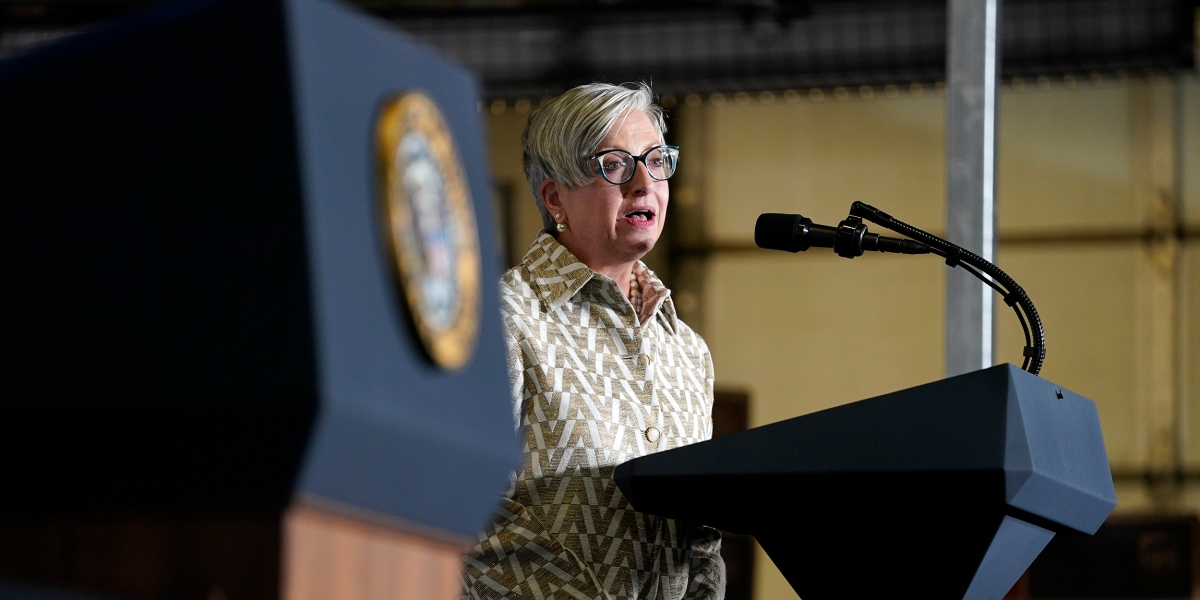Rodrick Reed was preparing to fly to Washington, D.C., for a vigil commemorating the anniversary of the U.S. Supreme Court’s 1972 ruling that briefly abolished the death penalty when he got the news: The Texas Court of Criminal Appeals, or the CCA, had once again ruled against his brother Rodney Reed, who has been on death row since 1998 for a crime he swears he did not commit.
The news made Rodrick’s remarks at the vigil even more urgent. “My brother was convicted of the murder and rape of Stacey Stites, and since that time, we’ve been living a nightmare that we cannot wake up from,” he said. “The reason I say it’s a nightmare is because the truth is out there, but nobody is willing to look at it or to pay attention to it. Evidence is out there that proves my brother’s innocence, but nobody is admitting it into the court.”
“I say, let all the evidence be looked at and heard and give him a new trial,” he continued. “We don’t need to free Rodney Reed, the truth will free Rodney Reed.”
“We don’t need to free Rodney Reed, the truth will free Rodney Reed.”
Reed, who is Black, was sentenced to death for the 1996 rape and murder of 19-year-old Stites, who was white. Her body was found on the side of a country road just outside Bastrop, Texas. Sperm recovered from Stites’s body was eventually matched to Reed, which prosecutors called the “Cinderella’s slipper” linking Reed to her death. But Reed insisted he was innocent; he said he’d been having an affair with Stites, who was engaged to a white police officer named Jimmy Fennell. Fennell denied the possibility of an affair, claiming that he and Stites had a loving relationship and she didn’t know anyone named Rodney Reed. Fennell was questioned several times but was never seriously considered as a suspect.
In the decades since Reed’s conviction, a host of evidence has emerged showing that Reed and Stites did know each other and Fennell was aware of their dalliance, dismantling the state’s theory of the crime. Evidence of Fennell’s propensity for violence has also surfaced; in 2008, he was sentenced to 10 years in prison for kidnapping and sexually assaulting a woman while on duty and in uniform. He threatened to kill her if she told anyone about it. Meanwhile, the courts — most notably the CCA — have shrugged their shoulders and rebuffed Reed’s efforts to win a new trial.
In a pair of rulings issued on June 28, the CCA again denied Reed’s pleas, which the court has now done at least a dozen times since 2000. Each time, the court has flatly rejected the mounting evidence of Reed’s innocence, often in ways that mischaracterize the evidence or interpret the law to make the revelations meaningless. In the most recent rulings, the court trivializes nearly every detail that casts doubt on Reed’s guilt.
I have covered Reed’s case for more than 20 years and have repeatedly fielded questions from people bewildered by the CCA’s position. Dozens of witnesses have come forward with information that supports Reed’s account and points to Fennell as the more likely killer, including friends of Stites’s and Fennell’s law enforcement colleagues. How can the court discount every single one of these witnesses? There are no good answers. The conclusion I’ve come to is one that is beyond the law and something that veterans of Texas’s criminal legal system have grumbled about for years: There are just some defendants the CCA judges don’t like and will steadfastly rule against, regardless of the evidence that might support their bid for a new trial or release. Rodney Reed is one of them.
A Secret Affair
When Reed was first questioned by police in connection with the murder, he denied knowing Stites aside from what he’d seen in the news. It was only after his DNA came back as a match that he relented and said the two had been having a clandestine affair. Although the CCA has pointed to Reed’s initial denial as undercutting his claim of an affair, which they deemed “manufactured and implausible,” it isn’t hard to see why Reed might have withheld this information: Even in mid-1990s Texas, a Black man dating a young white woman engaged to a white cop would have been a risky endeavor.
With the DNA match to Reed, the state devised a theory of the crime. Stites left the apartment she shared with Fennell around 3 a.m. to make the 30-mile commute to the grocery store in Bastrop where she worked the early shift stocking produce, only to be waylaid by Reed. Traveling on foot, Reed somehow stopped Stites’s vehicle, overpowered her, then raped and strangled her with her own belt — all presumably inside the truck — before dumping Stites’s body on the roadside and leaving the truck in the Bastrop High School parking lot.
Prosecutors didn’t offer any conclusive evidence demonstrating how all of this might have taken place. And the timeline itself was predicated on information that Fennell provided to investigators. He wasn’t awake when Stites left that morning, he told them, but he filled them in on what he said was her normal routine. Inexplicably, the cops failed to search the apartment the couple shared, even though it was the last place Stites was known to be alive. Days after the murder, the state released the truck to Fennell, who immediately got rid of it.
Although Reed’s trial attorneys promised to deliver evidence of his alleged affair with Stites, they fell far short, calling to the stand only a few witnesses, each with some connection to the Reed family. The defense was hamstrung by the fact that they had done little work to prepare for the capital trial. Records reflect that they only began working on the case in earnest a month before jury selection — hardly enough time to conduct their own investigation into who might have known what. They repeatedly asked the judge to postpone the trial but were denied.
In contrast, prosecutors told the jury that they had interviewed anyone with a plausible connection to the case — including all of Stites’s co-workers at the grocery store — and found no one who could back up Reed’s story. Investigators talked to “every boyfriend, every co-worker, every friend, every family member, everybody,” prosecutor Lisa Tanner told the jury. “Nobody connects them. Nobody. Folks, this secret affair was so secret that Stacey Stites didn’t know about it. That’s how secret it was — because it didn’t exist.”

Photo: Ricardo B. Brazziell/Austin American-Statesman via AP
Straining Credulity
It wasn’t long after Reed was convicted that other witnesses started coming forward. Not only did they confirm a preexisting relationship between Reed and Stites, but they also shared stories about Fennell’s jealousy, racism, and volatility — indications that he knew about the relationship and was furious about it. Every time, however, the CCA rejected the evidence.
There was a woman named Mary Blackwell, for example, who said she’d been in a law enforcement training class with Fennell. In an affidavit she provided to Reed’s lawyers in 2004, she said she heard Fennell tell a fellow trainee that if he ever caught his fiancée cheating on him, he’d strangle her with a belt. Texas prosecutors pointed out that no one else had admitted to hearing the comment, leading the CCA to discredit Blackwell’s story.
More recently, the CCA’s reflexive dismissal of witnesses whose claims call the state’s case into question has bordered on the absurd. In 2021, a judge in Bastrop presided over a nine-day evidentiary hearing that featured dozens of witnesses, including friends of Stites’s from work, members of law enforcement who knew Fennell, and former inmates imprisoned with Fennell. The witnesses testified that Stites and Reed had been involved in a relationship, that Fennell knew about it, and even that Fennell had confessed to Stites’s murder. None of these witnesses had any connection to Reed or his family.
Among the witnesses was a co-worker of Stites’s named Suzan Hugen, who testified that she and Stites were friends. She said she was aware that the relationship between Fennell and Stites was off; among other things, she’d seen finger-shaped bruises on Stites’s arms, which the younger woman tried to hide. Hugen also said that Stites had introduced her to her friend “Rodney.”
Hugen provided this information to the state well before Reed’s 1998 trial, yet it was never turned over to Reed’s attorneys. In fact, it wasn’t until just before the evidentiary hearing commenced in 2021 that the state finally made Hugen’s information available, along with statements from three other individuals that suggested other grocery store employees might also have known about a relationship between Stites and Reed. The decades-late disclosures prompted Reed’s lawyers to file an appeal claiming that the state had violated its obligation to turn over exculpatory information to the defense as required by the U.S. Supreme Court ruling known as Brady v. Maryland.
Despite overwhelming testimony in favor of Reed, the judge presiding over the evidentiary hearing fully embraced the state’s position that none of Reed’s witnesses were credible. Judge J.D. Langley signed off on findings written by the state, concluding that only the state’s witnesses, including Fennell, were reliable.
Reed’s attorneys challenged the ruling before the CCA, arguing that Langley had abdicated his responsibility to make independent determinations about witness credibility by simply adopting the state’s proposed conclusions, which were rife with errors and factual misrepresentations about various testimony, including Hugen’s.
In one of the rulings released on June 28, nearly two years after the evidentiary hearing concluded, the CCA lamented the errors — it listed several in a footnote with the caveat that the list was “by no means exhaustive” — before undertaking its own assessment of the witnesses’ credibility. Ultimately, the CCA concluded, as Langley had, that none of Reed’s witnesses were credible, save for one man whose father lived in the apartment just below Stites and Fennell, who reported hearing violent arguing on multiple occasions.
The man, Brent Sappington, said that he and his father, Bill, who has since died, approached a prosecutor the family knew at church to report what they’d heard. According to Sappington, the prosecutor, a man named Ted Weems, told them to hush up because investigators already had their suspect. Weems testified that Bill had reported the fighting upstairs, but he denied discouraging the family from coming forward. The CCA credited Sappington only to the extent that Weems “corroborated” his account; where the stories diverged, the CCA concluded that Weems was the one telling the truth. Sappington explained that he was initially hesitant to come forward because Fennell was in law enforcement and he feared his story would be dismissed, an explanation the court found to be an excuse that “strains credulity.”
Several other witnesses provided similar reasoning, saying they didn’t come forward sooner because they feared retaliation from a law enforcement community that they expected would protect its own. The court repeatedly found this explanation unconvincing. Other witnesses, who said they didn’t realize that what they knew was important, were dismissed as likely fabricating their recollections. While it’s true that memory can be tricky, the CCA failed to engage with any nuance and instead deployed a false-memory blanket across multiple witness statements as a one-stop discrediting device.
“For 23 years, Texas illegally hid evidence that could have exonerated Rodney Reed.”
Where Hugen was concerned, the court stated that the account she offered was “unremarkable, even mundane.” The judges also took aim at her recollection about seeing bruises on Stites’s arms, concluding that jurors would not have believed that since no bruises were found on Stites’s arms during the autopsy.
As for the state’s alleged Brady violation, the CCA concluded that the information Hugen had was “immaterial” since one witness had previously testified at Reed’s trial that she’d seen Reed and Stites together at the grocery store. Hugen’s account wouldn’t have added anything, the judges wrote, despite the fact that Hugen had no connection to the Reed family, and had her information been disclosed in a timely way, it would have offered Reed’s defense another avenue of investigation.
The court took the position that other witness statements were immaterial because the state had deemed them dead leads. In other words, if Texas prosecutors decided that the statements were meaningless, then they had no obligation to turn them over — a bastardization of Brady’s disclosure requirement that would afford prosecutors total discretion over what evidence is released to the defense. Although prosecutors cited their Brady obligation in releasing the witness information to Reed’s attorneys in 2021, the CCA’s opinion seemed to endorse the notion that it would have been perfectly fine for them to leave the information forever buried in the state’s files.
“The Whole World Will Know”
That the CCA would rule against Reed is neither new nor surprising — nor is the judges playing mental gymnastics with legal standards to get them to their desired result.
For decades, the court has been a myopic, hegemonic institution, composed largely of middle-aged, white, male jurists who were former prosecutors — a mix of factors that has created an insulated worldview within the court’s chambers in Austin. When the current presiding judge, Sharon Keller, first ran for a seat on the court back in 1994, she described herself as “pro-prosecutor,” meaning, she told a reporter, “seeing legal issues from the perspective of the state instead of the perspective of the defense.” That view has dominated the CCA bench for the last 30 years and reflects its approach to the Reed case.
The judge who wrote the June 28 opinions was its newest member, Jesse McClure, a former prosecutor-turned-Houston district court judge who was appointed to the bench in December 2020 by Texas Gov. Greg Abbott. Notably, he is only the third Black CCA judge since the court’s establishment in 1891. One judge, Scott Walker, dissented from the rulings but did not explain why.
Reed’s lawyers are frustrated. “For 23 years, Texas illegally hid evidence that could have exonerated Rodney Reed. He is an innocent man,” Jane Pucher, a senior staff attorney with the Innocence Project, said in a statement. “Texans should be outraged that prosecutorial misconduct is going unchecked, and the state is being given a license to cheat — even if it means sending an innocent man to his death.”
Pucher said Reed’s legal team is considering all its options, including asking the U.S. Supreme Court to review the case. Meanwhile, a separate legal effort to obtain DNA testing on key crime scene evidence, including lengths of the braided belt used to strangle Stites, is ongoing. Texas has long fought Reed’s bid to have the evidence tested; predictably, the CCA sided with the state, offering a novel interpretation of Texas’s DNA testing law to block Reed’s access. The dispute made it to the Supreme Court on a technical point, and this spring, the court ruled in Reed’s favor, sending the case back to the 5th U.S. Circuit Court of Appeals.
Rodrick is frustrated by the CCA’s continued hostility toward his brother, but he has vowed to keep fighting. At the vigil in Washington, D.C., he recalled something that his mother, Sandra, told the court back in 1998 when Reed was convicted. “She said, ‘You may try to take my son’s life, but I guarantee you the whole world will know about it.’”
